
Stigmella salicis is a moth of the family Nepticulidae which is found in Europe. It was first described by the English entomologist, Henry Stainton in 1854. The type locality is from England.
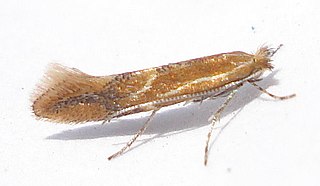
Phyllonorycter is a genus of moths in the family Gracillariidae.
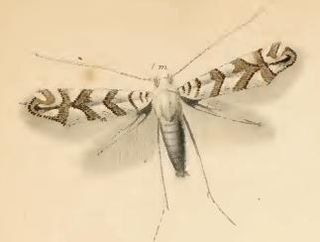
Phyllonorycter acerifoliella is a moth of the family Gracillariidae. It is found from Sweden to the Pyrenees, Italy, Albania and Bulgaria, and from Great Britain to southern Russia.

Phyllonorycter froelichiella is a moth of the family Gracillariidae. It is found in all of Europe, except Greece.
Phyllonorycter connexella is a moth of the family Gracillariidae. It is found from Fennoscandia to the Pyrenees and Italy and from France to central Russia and Ukraine.

Phyllonorycter tristrigella is a moth of the family Gracillariidae. It is known from all of Europe, except the Iberian Peninsula and the Balkan Peninsula, east to the European part of Russia. It was also recorded from Japan, but this is a misidentification of Phyllonorycter laciniatae.

Phyllonorycter strigulatella is a moth of the family Gracillariidae. It is found in the most of Europe, east to Russia and Japan.

Phyllonorycter dubitella is a moth of the family Gracillariidae. It is found from Fennoscandia and northern Russia to the Pyrenees, Italy and Bulgaria and from Great Britain to Ukraine.

Phyllonorycter geniculella is a moth of the family Gracillariidae. It is found from Sweden to the Pyrenees, Italy and Bulgaria and from Great Britain to southern Russia.

Phyllonorycter hilarella is a moth of the family Gracillariidae. It is found in all of Europe, except the Balkan Peninsula and the Mediterranean Islands.
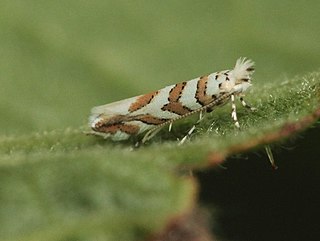
Phyllonorycter kuhlweiniella is a moth of the family Gracillariidae. It is found from Germany to the Iberian Peninsula, Italy and Albania and from Great Britain to central and southern Russia.

The European oak leaf-miner or Zeller's midget is a moth of the family Gracillariidae. It is found in Europe south of the line running from Ireland, through Great Britain, Denmark to Ukraine. It is also found in Macaronesia. It is an introduced species in New Zealand and Australia.

Phyllonorycter muelleriella is a moth of the family Gracillariidae. It is found from the Baltic States to the Pyrenees, Italy and Greece and from Great Britain to central and southern Russia.

Phyllonorycter quercifoliella is a moth of the family Gracillariidae. It is known from all of Europe, except for the Mediterranean islands.
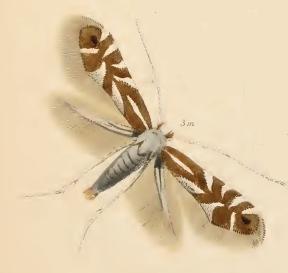
Phyllonorycter rajella is a moth of the family Gracillariidae. It is known from all of Europe, except the Iberian Peninsula and Greece.
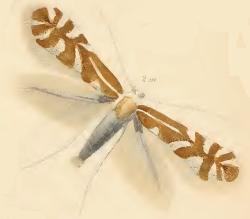
Phyllonorycter salicicolella is a moth of the family Gracillariidae. It is known from all of Europe, east to Russia and Japan.
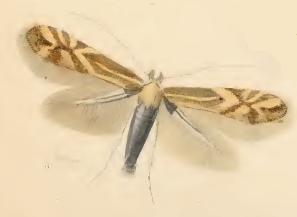
Phyllonorycter salictella is a moth of the family Gracillariidae. It is known from all of Europe, east to Russia and Japan.

Phyllonorycter schreberella is a moth of the family Gracillariidae. It is known from Europe, except northern Europe, Ireland and the Balkan Peninsula.

Phyllonorycter spinicolella, also known as the sloe midget, is a moth of the family Gracillariidae, first described by the German entomologist Philipp Christoph Zeller in 1846. It is probably present in all of Europe.
Synanthedon flaviventris, the sallow clearwing, is a moth of the family Sesiidae. The larvae form pear-shaped galls on sallows.













